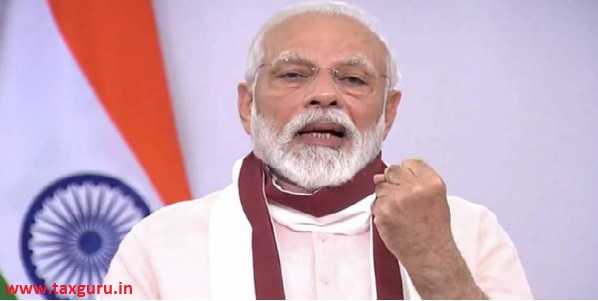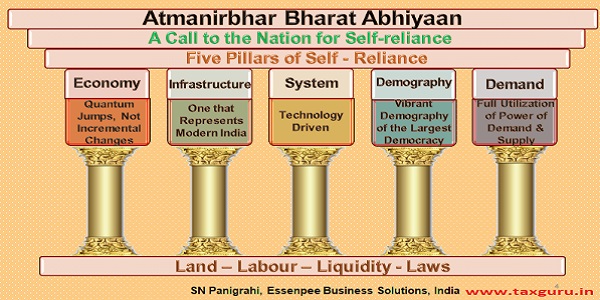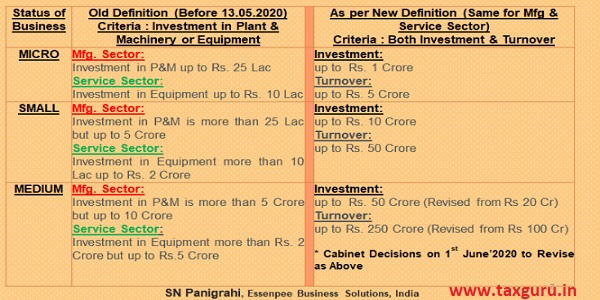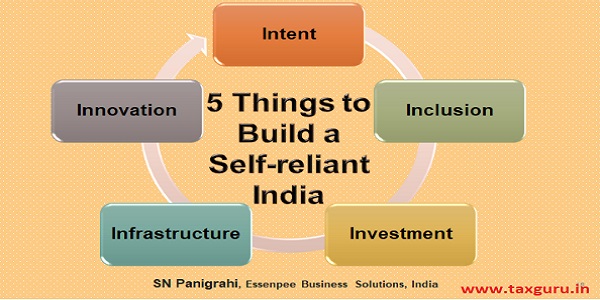With the unabated COVID-19 virus that is spreading fast, the Country is in a serious Crisis – Internally as well as Externally. National tensions already at high levels not seen in a generation over various issues like Article 370 to CAA and related protests, escalated into political unrest, violence, and conflict and uproar by some opposition leaders and vested interests and many more. Now COVID-19 is tipping the world into a dangerously volatile new era and India too affected without any exception – a new threat to Citizens of India over Health & Economy, added further Natural Calamities like Cyclones, untimely devasting rains, Locust attacks on Crop etc., crippling the country’s Socio – Economy Fabric causing a severe and almost insuperable problem and the country is on the verge of a Serious Trouble – health issues – social distancing – reduced domestic activity – stalled economic activity – issues especially related to informal and low-skilled workers, including within large internally displaced populations and migrants. On external front boarder security tensions with neighbouring countries forcing added attention. Culmination of all these turbulent events together dramatically downturn aggravating existing economic and human challenges, triggering a spiral of economic hardship and socio-political trouble.
Crisis Possess a Challenge and Test the Leadership. During a crisis, real leaders rise and become visible. … With a solid focus on right vision and determination good leaders rise above the circumstances and see into the future. Their ability to stand bold, confident and courageous even in the deepest crisis and in the face of unprecedented challenges, and navigate to stay focused, stable, steady and authentic approach to crisis, makes them ambassadors of hope and victorious.
In this severe crisis, our Visionary Prime Minister, Shree Narendra Modi Ji exhibiting his leadership ascent announced in his nationwide address on 12 May 2020, “Atmanirbhar Bharat Abhiyan” – “A Call to the Nation for Self – Reliance” that serves as a massive stimulus package as well as a move towards making India more self-reliant in the post-COVID world. The stimulus is focussed to strengthen India’s cottage and home industries, small and medium enterprises (SMEs) and other industries. Prime Minister Narendra Modi has announced a special economic package worth 20 lakh crore rupees for an ‘Atma-Nirbhar Bharat’ or self-reliant India, saying that self-reliance is the only way to ensure that 21st Century belongs to India.
Call for Atmanirbhar Bharat Abhiyan or Self-Reliant India Movement
♦ Five pillars of Atmanirbhar Bharat – Economy, Infrastructure, System, Vibrant Demography and Demand
♦ Special economic and comprehensive package of Rs 20 lakh crores – equivalent to 10% of India’s GDP
♦ Package to cater to various sections including cottage industry,
♦ MSMEs, labourers, middle class, industries, among others.
♦ Bold reforms across sectors will drive the country’s push towards self-reliance
♦ It is time to become vocal for our local productsand make them global.

This new vision of Atmanirbhar (self-reliant) Bharat is envisioned to be built on five pillars: economy, infrastructure, a system driven by technology and forward-looking policies, demography, and economic demand.
The Prime Minister noted that this package, together with earlier announcements by the government during COVID crisis and decisions taken by RBI, is to the tune of 20 lakh crore rupees. This is equivalent to almost 10 percent of India’s GDP.

The package will also focus on Land, Labour, Liquidity and Laws. It will cater to various sections including cottage industry, MSMEs, labourers, middle class, industries, among others. Atmanirbhar Bharat Abhiyan lays strong foundations to sail across the crisis and for raising our economic growth and long-term sustainability.
In his speech Prime Minister also told that “In this hour of crisis, local suppliers have met our demands; Indians have to be ‘Vocal about Local’ and buy products from them. This era of self-reliance will be our new pledge and new festival; we have to move on with new resolve”. Here he envisaged clear vision to Encourage “Made India” products which is right way to revive ailing Domestic Industry, especially MSME.
Following the Vision Statement of Prime Minister, the Union Finance Minister Nirmala Sitharaman made Five announcements on the Aatmanirbhar Bharat Abhiyan stimulus package.
Tranche 1:
MSME in a New Awatar:
The Prime Minister’s speech emphasized that the MSME sector will act as the bedrock for economic revival. Intending to get the MSME sector back on its feet, the Prime Minister announced the MSME sector to be within the purview of the Atma-Nirbhar Bharat Abhiyan. The Micro, Small, and Medium Enterprises (MSMEs) sector with More than 6 crore MSMEs is the most vibrant and dynamic industrial sector contributing significantly to the GDP and export while employing around 40 per cent of the Indian workforce.
Subsequently, the Finance Minister announced six regulatory measures as part of the Atma-Nirbhar Bharat Abhiyan especially for the MSME sector, as part of a series of announcements by the government. In current times, where the mere survival of the MSME sector is at stake, Atma-Nirbhar Bharat Abhiyan intends to address the needs of the MSME sector and paves a path for long-term sustainability and profitability of MSMEs.
In Atmanirbhar Bharat Abhiyaan, there are a Total of 6 Reforms to revive the MSME sector. These are:
Rs 3 lakh crores Collateral free Automatic Loans
Rs 20,000 crore Subordinate Debt for MSMEs
Rs 50,000 crore equity infusion through MSME Fund of Funds
New definition of MSMEs
Global tender to be disallowed up to Rs 200 crores
Other interventions for MSMEs
Revising the definition of MSME under applicable law is intended to bring more MSME enterprises under the purview of being classified as MSMEs so that they can reap benefits associated with it and revive their business and grow.
Under the new definition, the investment limit for micro, small and medium enterprises have been raised substantially and the distinction between manufacturing and services has been abolished. This measure will widen the net of benefits associated with classification as an MSME to more enterprises.

In order to redefine the MSME, government has taken following measures:
> Increased Investment Limit
> Introduced additional criteria of turnover
> Eliminated difference between Manufacturing & Service sector
The collateral-free automatic credit line and the subordinate debt to MSMEs may be a game-changer for a sector which is finding it harder and harder to find credit support from banks and other financial institutions. It will make it lucrative for risk-averse banks to resume lending operations as the government will act as 100 per cent guarantor on both the principal and the interest. The guarantee from the government will ease pressure on banks and other financial institutions as they will not have to make provisions in case the loan account turns into a non-performing one.
The Finance Minister also announced the creation of ‘Fund of Funds’ with a corpus of Rs 10,000 crores where the government through the funds will pick up an equity stake in the MSMEs with growth potential and viability. These equity infusions will lead to increase in size and capacity of the MSMEs and the revision in the definition of MSME is correlated to this. Further, the long-term goal of such equity infusion is to encourage the MSMEs to list on stock exchanges.
Online marketplace for MSMEs is intended to help all market participants, including end-consumer. Affordable products and services and the narrative of ‘Make-in-India’ and national unity during marketing will be attractive to the cash-strapped consumer.
Startups are not explicitly covered in the definition of MSME; however, startups operating in manufacturing and ancillary services sector especially medical devices, robotics etc. may consider registering themselves as MSME. The host of benefits such as priority lending to cluster financing, exemptions, tax soaps etc. will be available to such startups along with the new benefits under the scheme.
Tranche 2:
Second Tranche focused on Migrant Workers, Street vendors, Small Traders, Self Employed People, Small Farmers. The FM covers 9 major announcement of the Atma Nirbhar Bharat Abhiyan here-
♦ Free Food grain Supply to Migrants for next 2 months-Central government to spend 3500 crore to provide free foodgrain supply to migrants and the benefit is also extended to 8 crore migrants who do not have ration cards or are not covered under national food security act. Govt will give 5 kgs/person of wheat or rice and 1 kg/family of channa for non-PDS card holders for 2 months.
♦ 1 Nation 1 Ration Cardwill be implemented- 67 crore beneficiaries in 23 states will get covered in this scheme by August 2020 and FM said that they’ll ensure 100% coverage of ration card portability by March 2021.
♦ Affordable rent and accommodation for migrant worker and urban poor in PM Awas Yojana– incentivising industries for accommodation for housing of migrants. Govt is looking to convert vacant buildings in metro cities for housing.
♦ Interest Subvention Incentive of 2% in Shishu Loan in Mudra-loans under Rs. 50,000 qualify for Interest SOP. Over 3 Crore mudhra shishu loan beneficiaries to get SOP.
♦ Easy Access to Credit for all Street Vendors– 5000 crore special credit facility for 50 lakh street vendors.
♦ Credit Link subsidy Scheme for housing extended upto March 2021 for Lowest Strata of Middle Income Group– The scheme was started in 2017 and is being extended for 1 year for families with annual income upto 6 to 18 Lakhs only can enroll for affordable housing. The scheme is expected to benefit 2.5 Lakh families.
♦ Promoting Employment in Tribal Area-Rs 6,000 crore CAMPA funds will be made available in tribal and adivasi areas for job creation and development activities
♦ Rs 30,000 crore additional emergency working capital fundingfor farmers through NABARD.
♦ 2 Lakh crore of concessional creditwill be extended to boost economic activties amongst farmers through kisan credit card.
Tranche 3:
Finance Minister Nirmala Sitharaman’s announcement on 15th May focussed on Strengthening India’s Agriculture and Allied Activities Sector; She also announced Governance Reforms.
Key highlights from the Announcement:
> INR 100,000 crore for strengthening farm gate infrastructure
> INR 20,000 crore fund under Pradhan Mantri Matsya Sampada Yojana for integrated, sustainable, inclusive development of marine and inland fisheries
> INR 4,000 crore allocated to support farmers growing herbal and medicinal plants along River Ganga
> The Essential Commodities Act (1955) amended to tackle abundant crop
> Farmers to be given a choice to sell; inter-state and e-trade to be facilitated
> INR 10,000 crore fund for micro-food enterprises to encourage export of locally made products
> INR 15,000 crore fund to support and develop dairy infrastructure and cattle-feed infrastructure
> INR 500 crore to support beekeeping initiatives
> INR 500 crore subsidy to support disruption of supply chain of fruits and vegetables
> Development of a legal framework to assist farmers fix their own price
The first Three Tranches of Stimulus announced are aimed at empowering People to help them become Self-Sufficient and earn livelihoods.
Tranche 4:
The fourth tranche of INR 20 lakh crore economic package announced by Finance Minister Nirmala Sitharaman on 16th May streamlines processes to fast-track investments in key sectors, builds a solid ground for executing Prime Minister Narendra Modi’s vision of ‘vocal for local’, enables employment generation, brings consumers at the centre stage and most importantly, creates ample room to unleash the benefits of privatisation.
Key highlights from the announcement
♦ Privatisation of coal mines with 50 new blocks to be auctioned
♦ 500 mineral blocks to be privatised through open and joint auction with coal
♦ Domestic procurement for a notified list of weapons, equipments and spares for defence-related manufacturing
♦ Air space to be rationalised and optimally utilised to save fuel and time
♦ Six more airports to be auctioned on PPP basis, additional private investments in 12 existing airports
♦ Making India a Maintenance, Repair and Overhaul hub for both civil and defence aircrafts
♦ Privatisation of power distribution companies in Union Territories
♦ INR 8,100 crore provision made for 30% viability gap funding available for social infrastructure projects
♦ Private participation in space programmes and geo-spatial data to be made available for private sector
♦ PPP for promoting low cost cancer treatment and establishing research facilities for food sector
Tranche 5:
The tranche 5 of measures was a continuation of several reforms addressing challenges related to land, labour, liquidity, and laws announced in the last four days.
Key highlights from the announcement
> INR 40,000 crore additional allocation to MGNREGS
> All districts to have infectious diseases wards in hospitals; public health labs at block-level
> PM e-VIDYA to be launched for school education
> Debt defaults related to COVID-19 will be excluded from definition of ‘default’ under IBC
> Decriminalise all violations of technical and procedural nature compliances under Companies Act
> Companies can list their securities directly in foreign jurisdiction. Direct listing overseas without the need to list in India is a massive benefit for start-ups, high-tech and biotech, metals and minerals etc., which are better understood by investors in specific markets overseas. This will reverse flight of capital and off-shoring of Indian companies.
> A new Public Sector Enterprise Policy to allow private sector to operate in all sectors
> States borrowing limit increased from 3% to 5% of the GSDP
Cabinet Decisions on 1st June’2020
♦ Historic decisions for MSME sector, street vendors and farmers taken
♦ MSME definition revised for the first time after 14 years
♦ Definition of medium units enhanced further to Rs 50 crore investment and Rs 250 crore turnover
♦ Special Micro Credit Facility Scheme ‘PM SVANidhi’ (PM स्वनिधि ) for providing affordable loans to street vendors launched. This scheme will go a long way in enabling them to resume work and earn livelihoods.
Over 50 lakh people, including vendors, hawkers, thelewalas, rehriwala, theliphadwala etc. in different areas / contexts are likely to benefit from this scheme.
The goods supplied by them range from vegetables, fruits, ready-to-eat street foods, tea, pakodas, breads, eggs, textiles, apparel, footwear, artisan products, books/ stationaries etc. The services include barber shops, cobblers, pan shops, laundry services etc.
The vendors can avail a working capital loan of up to Rs. 10,000, which is repayable in monthly instalments in the tenure of one year. On timely/ early repayment of the loan, an interest subsidy @ 7% per annum will be credited to the bank accounts of beneficiaries through Direct Benefit Transfer on six monthly basis. There will be no penalty on early repayment of loan.
The scheme provides for escalation of the credit limit on timely/ early repayment of loan to help the vendor achieve his ambition of going up on the economic ladder
♦ Encouraging digital transactions:
The scheme incentivises digital transactions by the street vendors through monthly cash back.
♦ 4- Focus on capacity building:
MoHUA in collaboration with State Governments, State Missions of DAY-NULM, ULBs, SIDBI, CGTMSE, NPCI and Digital Payment Aggregators will also launch a capacity building and financial literacy programme of all the stakeholders and IEC activities throughout the country during the month of June and loaning will commence in the month of July.
♦ For Kharif season 2020-21, government keeps its promise of fixing MSP at a level of at least 1.5 times of the cost of production. MSP of 14 crops for the Kharif season 2020-21 has been announced, based on the Recommendation of CACP. The return over cost for theses 14 crops ranges from 50% to 83%.
♦ Repayment dates for short-term loans for agriculture and allied activities extended; farmers to also get benefit of interest subvention and prompt repayment incentive
♦ Caring for the poor is the top focus of the government
This was seen in the announcement of the Pradhan MantriGaribKalyanYojana package on 26th of March 2020, within just two days of the start of lockdown.
From ensuring coverage of around 80 crore people with food security to direct cash transfers into the bank accounts of 20 crore women, from putting money into the hands of senior citizens, poor widows and poor Divyangs to front-loading of the PM-KISAN instalment to crores of farmers, steps were announced. These covered a wide range of vulnerable sections who would have borne the brunt of the lockdown if not for the immediate intervention of the government. Moreover, these were not mere announcements. Within days, assistance reached crores of people directly, either in cash or kind.
Government of India has laid down the road map for effective implementation of other announcements under the Atmanirbhar Bharat Package too. These include:
♦ Upward revision of MSME Definition. This is yet another step towards ease of doing business. This will help in attracting investments and creating more jobs in the MSME sector;
♦ Proposal for provisioning of Rs 20,000 crore as subordinate debt to provide equity support to the stressed MSMEs has been formally approved by the cabinet today. This will benefit 2 lakh stressed MSMEs.
♦ Proposal for equity infusion of Rs. 50,000 crores for MSMEs through fund of funds has also been approved by the Cabinet today. This will establish a framework to help MSMEs in managing the debt-equity ratio and in their capacity augmentation. This will also provide an opportunity to get listed in stock exchanges.
Centre announces ‘Mudra Shishu Loan‘ for small businesses and cottage industries
A 1500 crore interest subvention for small business and cottage industries has been announced under Mudra Shishu loan. Under this scheme, one lakh beneficiaries can avail interest benefit of 2 per cent for a year.
A Rs 5000 crore package was announced for the roadside hawkers. Under this, 50 lakh street vendors can avail loan upto Rs 10,000. Street vendors can contact any nationalised bank to avail the benefit.
Instilling Hope & Confidence through Mann Ki Baat
Like in every month this time also in a Mann Ki Baat, Prime Minister on 31st May try to send the Message about Hope & Confidence to fight Corona. The Highlights are :
> India is combating the Coronavirus menace with Sankalp Shakti as well as Sewa Shakti
> People across India are coming up with innovative solutions to fight against Coronavirus
> Working towards all-round development of every Indian
> Yoga is Good for Community, Immunity and Unity
> Ayushman Bharat benefits over one Crore Patients, saves Rs 14,000 Cr Treatment Cost for Poor.
> Work towards conserving every Drop of Water, save Rain Water
> Keep Fighting, Wear a Mask, Wash Hands and take all other Precautions
> Economy getting active now
PM Speaking @ CII : 5 Things to Build a Self-reliant India
While delivering the Inaugural Address at CII Annual Session 2020, Getting Growth Back, through video conference, Prime Minister Narendra Modi on 2nd June’2020, listed five things that will help India mitigate the impact of the coronavirus pandemic and bring back the country to a high growth trajectory.
“To bring India on the path of rapid development again, five things are very important to build a self-reliant India – Intent, Inclusion, Investment, Infrastructure and Innovation,” the PM said during his first major speech on the Indian economy since the announcement of Unlock 1.

“For us, reforms are not any random or scattered decisions. For us, reforms are a systemic, planned, integrated, inter-connected and futuristic process. For us, reforms mean having the courage to make decisions, and taking them to a logical conclusion,” PM added.
The Coronavirus outbreak has Redefined the Responsibilities of Citizens and the Business Community
While the Bold Decisions and Measures taken by the Government lead by Able, Efficient & Visionary Prime Minister Shree Narendra Modi Ji can help contain the spread of the coronavirus and Revive the Economy, the outbreak has redefined the responsibilities of citizens and the business community and highlighted the Commitment & Support from every Citizen in the Fight against the pandemic.
As a True Citizens Our Resolution, Our Determination, Our Decisions & Actions, Our outlook only can Change Our Future. The Message of our PM “Vocal for our Local products” has greater meaning to Revive Our Economy & Win over the Present Crisis is Boycott Videshi (Chinese) Products and Encourage & Consume Swadeshi (Domestic) Goods.





